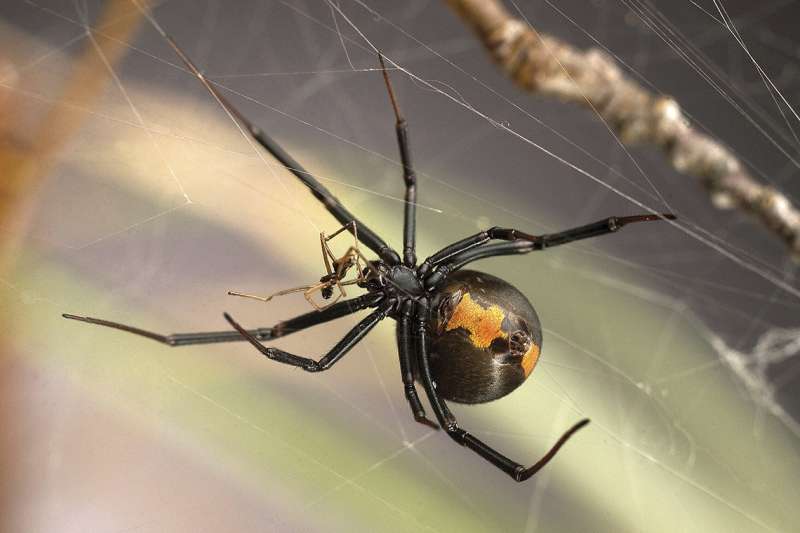Study on redback spiders finds seemingly abhorrent mating strategy appears to benefit both males and females

A mating strategy among redback spiders where males seek out immature females appears to benefit both sexes, a new University of Toronto study has found.
"There's no evidence to suggest this behaviour is costly to females in terms of survivorship and reproductive output," says Luciana Baruffaldi, post-doctoral researcher and director of the Andrade lab at U of T Scarborough and lead author of the research published in the journal Scientific Reports.
The research builds on past work by the Andrade lab that found some male redback spiders will avoid being cannibalized by mating with immature females that are not experienced in eating their partners. For this study, they wanted to determine whether males mating with immature females was a sign of "coercion" – a male mating tactic that was costly to females.
At least superficially, the behaviour appeared to be against the female's best interest. For one, males in this case mate with little investment in courtship, mating will sometimes injure females, while females will often attack potential mates, suggesting resistance.
But what they found was that being mated as an immature has no cost to females in terms of reproductive output or survival, and that females mating in this way do not signal for additional mates in the future.
"This early mating may be good for female redback spiders because in nature they're at risk of not finding a mate at all," says Baruffaldi.
Any delays in mating are costly for female redbacks. Not only do they lose out on potential offspring, past research has shown that unmated females have shorter lifespans than mated females, likely the result of having eggs that have to be maintained that can be a drain on their resources.
Redbacks, a species of venomous widow spiders, are one of few arachnids that engage in sexual cannibalism while mating. In fact, males have been observed to actively assist in being cannibalized by doing summersaults to place their abdomen over the adult female's mouth. In the majority of cases, females will continue to eat the male even while they mate. But this seemingly extreme form of mating also appears to have advantages in terms of reproductive success.
Professor Maydianne Andrade, co-author of the research and Baruffaldi's thesis supervisor, says the behaviour needs to be considered in terms of its evolutionary consequences.
"When you study evolutionary ecology, there's a temptation to ascribe human characteristics or judgments on the behaviour being observed," says Andrade, a world-renowned expert on the mating habits of cannibalistic spiders.
"What we're seeing could have more than one evolutionary implication, and even if it looks abhorrent to us, the evolutionary consequence can be positive for the animal engaging in that behaviour."
Andrade says if we want to think about why a particular set of behaviours has evolved, the underlying question is how it may affect the reproductive success of the animal doing it.
"That's the evolutionary currency – what's playing out over time is the number of gene copies left behind in offspring," she says.
More information: Luciana Baruffaldi et al. Neutral fitness outcomes contradict inferences of sexual 'coercion' derived from male's damaging mating tactic in a widow spider, Scientific Reports (2017). DOI: 10.1038/s41598-017-17524-6
Journal information: Scientific Reports
Provided by University of Toronto



















